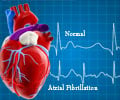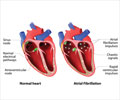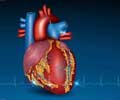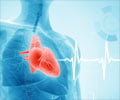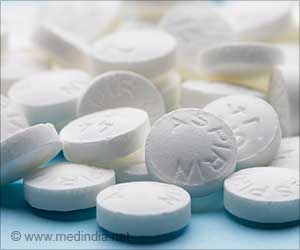A groundbreaking study identifies a new therapeutic target for cardiac arrhythmias, offering hope for improved treatments and better patient outcomes.

Atomistic mechanisms of the regulation of small-conductance Ca2+-activated K+ channel (SK2) by PIP2
Go to source).
What is Atrial Fibrillation
Atrial fibrillation, commonly called AFib or AF, causes about 1 in 7 strokes, according to the U.S. Centers for Disease Control and Prevention, and is associated with a significant increase in the risk of morbidity and mortality. More than 12 million people are expected to have AFib by 2030, according to the American Heart Association, and current treatment paradigms remain inadequate, researchers say.‘New hope for #atrialfibrillation treatment! Researchers have identified a potential target for a new therapy to treat #AFib, the most common #heartrhythm disorder. #AFib #hearthealth’





Proteins involved in physiological processes of the heart have been a target of research for AFib for some time. Until recently, most research suggested that treating AFib through inhibition of specific small-conductance calcium-activated potassium channels, or SK channels, could either reduce or worsen arrhythmias under different conditions. “Our study used pioneering experimental and computational approaches to decipher how the human SK2 channel can be dynamically co-regulated. The study is especially timely considering inhibitors of SK channels are currently in clinical trials to treat AFib, making further insight into their regulatory mechanisms paramount,” said Nipavan Chiamvimonvat, MD, chair of the Department of Basic Medical Sciences at the U of A College of Medicine – Phoenix.
The paper, “Atomistic Mechanisms of the Regulation of Small Conductance Ca2+-Activated K+ channel (SK2) by PIP2,” was published in the journal Proceedings of the National Academy of Sciences.
Unlocking the Secrets of Heart Rhythm
The research team examined the role of a lipid – phosphatidylinositol 4,5-bisphosphate, or PIP2 – in regulating the SK2 channel. PIP2 is an integral component of all plant and animal cell membranes and acts as a messenger for a variety of signaling pathways in the body.“Because PIP2 plays such an essential role in multiple ion channels, regulating cardiac ion channels through PIP2 presents a new mechanism for the lipid regulation of cardiac excitability and function,” said computational biologist Ryan Woltz, PhD, the paper’s co-first author and an assistant research professor at the College of Medicine – Phoenix.
Advertisement
“Since PIP2 is known to be dysregulated in heart failure, our study provides critical translational insights into possible mechanisms of cardiac arrhythmias in heart failure,” said co-first author Yang Zheng, PhD, a postdoctoral research fellow at the College of Medicine – Phoenix.
“Structural insights from our study will be useful to design novel inhibitors of SK2 channels to treat cardiac arrhythmias,” said Vladimir Yarov-Yarovoy, PhD, a professor at UC Davis Health.
Co-senior author Igor Vorobyov, PhD, an associate professor at UC Davis Health, said the team is already using similar computational approaches to study other SK channel subtypes.
“I am thrilled to participate in this collaborative multi-university and multidisciplinary research study and looking forward to a continued collaboration,” Vorobyov said. “We are currently working on applying a similar pioneering experimental/computational approach to modulation of SK channels by drug molecules, which may enhance or inhibit function of these ion channels and can be used as prospective treatment options for AFib and other cardiovascular diseases.”
Reference:
- Atomistic mechanisms of the regulation of small-conductance Ca2+-activated K+ channel (SK2) by PIP2 - (https://www.pnas.org/doi/10.1073/pnas.2318900121)
Source-Eurekalert

